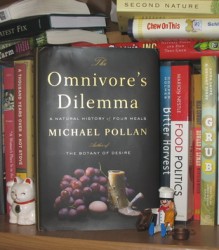The Locavore’s Bookshelf: The Omnivore’s Dilemma
Everyone is reading Michael Pollan’s The Omnivore’s Dilemma: A Naturaly History of Four Meals, and talking about it.
And, everywhere you go in the media, Michael Pollan is there, talking about the ethics of eating.
It seems that I cannot open a newspaper, magazine or look at a blog without Pollan’s name, book, byline or photograph jumping up at me.
Which is fine, because I think it is great that The Omnivore’s Dilemma has taken off like this; the US agribusiness industry has needed a metaphorical “shot across their bow” from an eloquent ethicist for a long time now, and I am happy to see that Pollan has managed that verbal barrage as gracefully and as enthusiastically as he has.
The fact that there are news stories and radio interviews and sections of Time Magazine devoted to the issue of where our food comes from, and how it is treated before it gets to us has started a public dialogue that is long overdue; Americans for years have not known what went into the food supply, and have, in my opinion, sorely needed to know. Most people do not like the idea of animals suffering, and while -I- have known for years what the horrors of a feedlot and slaughterhouse are, and what risks they pose to public and environmental health, I also know that I am a weirdo who has been reading up on the subject via non-popular literature and research for years. My reading has led me to giving up on feedlot meat entirely -years ago- in favor of locally raised, pastured meats,.
What thrills me about the popularity of Pollan and his book is that he is bringing what I have known about for since, like, ever, to the populace at large, and doing it in a way that keeps the readers interested and fascinated while still pummelling their brains with fact upon fact upon fact, all written with wit and style to spare.
But, Barbara, what did you think of the book itself?
Well, it’s like this.
Pollan presented very little new information to me in the form of raw facts. As I said, I have been reading up on this stuff and doing research on it for, oh, twenty-something odd years. Yeah, I -am- obsessed. But, even with my twenty-year-old obsession, Pollan -still- managed to present some gemlike facts I had not run across before, and those gleamed like beacons and were squirrelled away into my mind to be hoarded along with my other facts, ready for the next argument I get into over industrialized farming.
However, while the information itself wasn’t news to me–it didn’t matter. I still stayed rivetted to every page, fascinated with the way that Pollan wove all of that information into a narrative that managed to be both factual and personal, interesting and compelling, while still conveying a great deal of raw data. He can manage to write about some of the most dry facts in the world and make them fascinating reading. I swear, he could compose a grocery list that was fun to read.
And while I found his chapters on corn got to be a bit long and somewhat dry, he made up for it in his later chapters about Joel Salatin’s Polyface Farm and his experiences hunting for mushrooms and wild boar out in Northern California. Here, Pollan’s “let’s make it personal and tell a story” style of reporting really shone, and it was great fun to follow him on his adventures as he lived and worked on a farm, and tramped through the woods. I especially enjoyed the passages where Pollan described how it felt to take part in butchering chickens (my least favorite animal to butcher, frankly) and to shoot and field dress a wild boar. (Yes, the insides of pigs smell bad.)
I really appreciated his insights as a city person, stretching himself and his personal boundaries as he sought to experience three meals fully: one taken from the industrialized farms that provides the majority of American food, one from a sustainable-agriculture grass-based farm, and one gleaned from the wild through hunting and foraging. His inner monologue as he went through these experiences and recorded them, and his thoughts and feelings were instructive, illustrative, and just damned funny, too.
So, yes–I really liked the book, and I highly recommend that everyone should read it, whether you are interested in eating locally or not.
Because, frankly, if you are not interested in it before you read it–I have a feeling you will be -after- you read it.
3 Comments
RSS feed for comments on this post.
Sorry, the comment form is closed at this time.
Powered by WordPress. Graphics by Zak Kramer.
Design update by Daniel Trout.
Entries and comments feeds.




After that, it will be hard not to seek out the book and read it. Thanks for a brilliant write up.
Comment by tanna — June 29, 2006 #
Thank you, Tanna! I am glad to be of service.
Comment by Barbara — June 29, 2006 #
You’re right, the corn chapters were the hardest to get through. But now, about 6 weeks after I finished reading it, those chapters are the ones I quote from most often when I’m annoying all and sundry with my (newish) obsession.
Comment by lucette — July 2, 2006 #